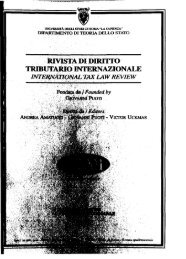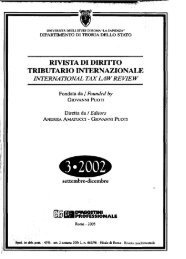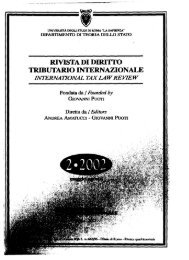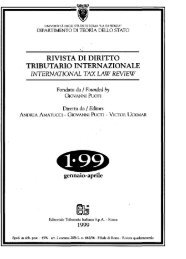RIVISTA DI DIRITTO TRIBUTARIO INTERNAZIONALE - Rdti.it
RIVISTA DI DIRITTO TRIBUTARIO INTERNAZIONALE - Rdti.it
RIVISTA DI DIRITTO TRIBUTARIO INTERNAZIONALE - Rdti.it
You also want an ePaper? Increase the reach of your titles
YUMPU automatically turns print PDFs into web optimized ePapers that Google loves.
Sezione I - Dottrina<br />
cedural inst<strong>it</strong>ution will be specifically penalised because of <strong>it</strong>s less incisive<br />
and more procedurally burdensome characteristics (3S). Having noted<br />
the different operative range of the two different fonns of interpellation,<br />
a further distinction must be made from the standpoint of the effects<br />
of the said cases. When the provisions of Art. 21 of Law No.<br />
413/1991 are coordinated w<strong>it</strong>h the relative implementation regulations, <strong>it</strong><br />
can be seen that once the requis<strong>it</strong>es of completeness and truthfulness are<br />
met, the sphere of effectiveness of the relative opinion is lim<strong>it</strong>ed to the<br />
"taxation relationship", and in the context of the seat of l<strong>it</strong>igation, if any,<br />
<strong>it</strong> affects the distribution of the burden of proof laid "to the charge of the<br />
party that has not complied w<strong>it</strong>h the opinion of the Comm<strong>it</strong>tee". In the<br />
light of this consideration, since the Financial Administration, as<br />
c1aimant in a substantial sense, already bears the burden of proof in<br />
court, the taxpayer, if he has not complied w<strong>it</strong>h the opinion expressed by<br />
the consultant body, will become obliged to prove, in the course of the<br />
proceedings, the unfoundedness of the taxation c1aim (36). Il does not appear<br />
possible to extend the said effect to ordinary interpellation even w<strong>it</strong>h<br />
regard to the content of Ministerial Circular No. SOIE of 2001 which,<br />
when specifying that the binding nature of the Administration's interpretation<br />
is operative only in relation to the offices, and "does not affect the<br />
(35) S. La Rosa, "Prime considerazioni sul dir<strong>it</strong>to di interpello", in '11 Fisco", 1992, p.<br />
7948, suggests that the Comm<strong>it</strong>tee should be made into "consultant structure internal to<br />
tbe administrative system", hoping that tbe "two levels will be reduced to only one".<br />
(36) On this point, see G. Zizzo, "Dir<strong>it</strong>to d'interpello e ruling", in Riv. dir. trib., 1992,<br />
I, p. 146, according to whom, since in Italy, as in France, there exists no presumption<br />
of leg<strong>it</strong>imacy in favour of the contested act, as the Office must provide the proof of<br />
the events on which the tax claim is based, the Comm<strong>it</strong>tee's opinion ,-,"ilI produce <strong>it</strong>s<br />
effect on the mechanisms that regulate the distribution of the burden of proof only if<br />
and when the taxpayer has not complied w<strong>it</strong>h the opinion expessed by the Comm<strong>it</strong>tee<br />
<strong>it</strong>self. Along the same lines, see M. Buzzone, Interpello ordinario, speciale e "tax mling"<br />
negativo: i differenti effetti dei pareri, in Corr. trib., No. 26/2001, p. 1923.<br />
S. La Rosa, Prime considerazioni sul dir<strong>it</strong>to di interpello, in Il fisco, No 32/92, p.<br />
7950, remarks that "the party who does not intend to comply w<strong>it</strong>h the opinion bears<br />
the burden of proving that the actual circumstance does not correspond exactly to the<br />
one on which the Comm<strong>it</strong>tee had expressed <strong>it</strong>s opinion; which is equivalent to saying<br />
(in pos<strong>it</strong>ive terrns) that the opinion has a substantial effectiveness of <strong>it</strong>s own, consisting<br />
of the creation of a binding defin<strong>it</strong>ion of the case as the s<strong>it</strong>uation appears from<br />
the documents filed at the time".<br />
Although the effects deriving from Art. 21 of Law No. 413/91 are essentially similar<br />
to those of a legaI presumption, <strong>it</strong> appears preferable to believe that the judge, in<br />
the absence of proof of the contrary, is not onliged to comply w<strong>it</strong>h what is foreseen in<br />
the opinion, as he can ignore <strong>it</strong> and define the case in point in a different manner following<br />
the sources foreseen in pos<strong>it</strong>ive law. Contra Consolo, op. c<strong>it</strong>., p. 963.<br />
<strong>RIVISTA</strong> <strong>DI</strong> <strong>DI</strong>RITTO <strong>TRIBUTARIO</strong> <strong>INTERNAZIONALE</strong> 312001






